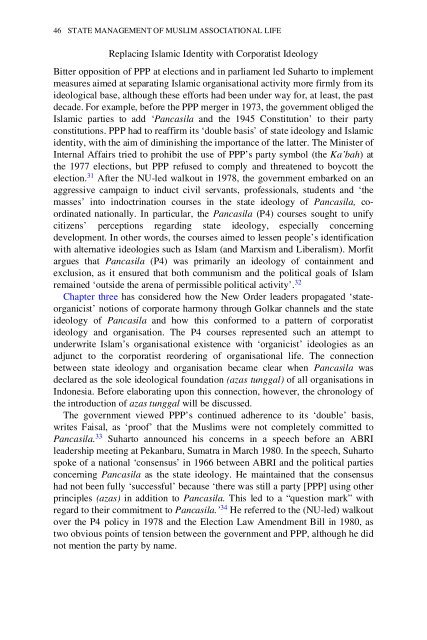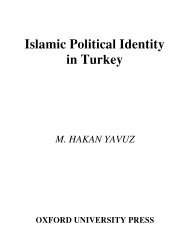Create successful ePaper yourself
Turn your PDF publications into a flip-book with our unique Google optimized e-Paper software.
46 STATE MANAGEMENT OF MUSLIM ASSOCIATIONAL LIFEReplac<strong>in</strong>g <strong>Islam</strong>ic Identity with Corporatist IdeologyBitter opposition of PPP at elections <strong>and</strong> <strong>in</strong> parliament led Suharto to implementmeasures aimed at separat<strong>in</strong>g <strong>Islam</strong>ic organisational activity more firmly from itsideological base, although these efforts had been under way for, at least, the pastdecade. For example, before the PPP merger <strong>in</strong> 1973, the government obliged the<strong>Islam</strong>ic parties to add ‘Pancasila <strong>and</strong> the 1945 Constitution’ to their partyconstitutions. PPP had to reaffirm its ‘double basis’ of state ideology <strong>and</strong> <strong>Islam</strong>icidentity, with the aim of dim<strong>in</strong>ish<strong>in</strong>g the importance of the latter. The M<strong>in</strong>ister ofInternal Affairs tried to prohibit the use of PPP’s party symbol (the Ka’bah) atthe 1977 elections, but PPP refused to comply <strong>and</strong> threatened to boycott theelection. 31 After the NU-led walkout <strong>in</strong> 1978, the government embarked on anaggressive campaign to <strong>in</strong>duct civil servants, professionals, students <strong>and</strong> ‘themasses’ <strong>in</strong>to <strong>in</strong>doctr<strong>in</strong>ation courses <strong>in</strong> the state ideology of Pancasila, coord<strong>in</strong>atednationally. In particular, the Pancasila (P4) courses sought to unifycitizens’ perceptions regard<strong>in</strong>g state ideology, especially concern<strong>in</strong>gdevelopment. In other words, the courses aimed to lessen people’s identificationwith alternative ideologies such as <strong>Islam</strong> (<strong>and</strong> Marxism <strong>and</strong> Liberalism). Morfitargues that Pancasila (P4) was primarily an ideology of conta<strong>in</strong>ment <strong>and</strong>exclusion, as it ensured that both communism <strong>and</strong> the political goals of <strong>Islam</strong>rema<strong>in</strong>ed ‘outside the arena of permissible political activity’. 32Chapter three has considered how the New Order leaders propagated ‘stateorganicist’notions of corporate harmony through Golkar channels <strong>and</strong> the stateideology of Pancasila <strong>and</strong> how this conformed to a pattern of corporatistideology <strong>and</strong> organisation. The P4 courses represented such an attempt tounderwrite <strong>Islam</strong>’s organisational existence with ‘organicist’ ideologies as anadjunct to the corporatist reorder<strong>in</strong>g of organisational life. The connectionbetween state ideology <strong>and</strong> organisation became clear when Pancasila wasdeclared as the sole ideological foundation (azas tunggal) of all organisations <strong>in</strong><strong>Indonesia</strong>. Before elaborat<strong>in</strong>g upon this connection, however, the chronology ofthe <strong>in</strong>troduction of azas tunggal will be discussed.The government viewed PPP’s cont<strong>in</strong>ued adherence to its ‘double’ basis,writes Faisal, as ‘proof’ that the Muslims were not completely committed toPancasila. 33 Suharto announced his concerns <strong>in</strong> a speech before an ABRIleadership meet<strong>in</strong>g at Pekanbaru, Sumatra <strong>in</strong> March 1980. In the speech, Suhartospoke of a national ‘consensus’ <strong>in</strong> 1966 between ABRI <strong>and</strong> the political partiesconcern<strong>in</strong>g Pancasila as the state ideology. He ma<strong>in</strong>ta<strong>in</strong>ed that the consensushad not been fully ‘successful’ because ‘there was still a party [PPP] us<strong>in</strong>g otherpr<strong>in</strong>ciples (azas) <strong>in</strong> addition to Pancasila. This led to a “question mark” withregard to their commitment to Pancasila.’ 34 He referred to the (NU-led) walkoutover the P4 policy <strong>in</strong> 1978 <strong>and</strong> the Election Law Amendment Bill <strong>in</strong> 1980, astwo obvious po<strong>in</strong>ts of tension between the government <strong>and</strong> PPP, although he didnot mention the party by name.




